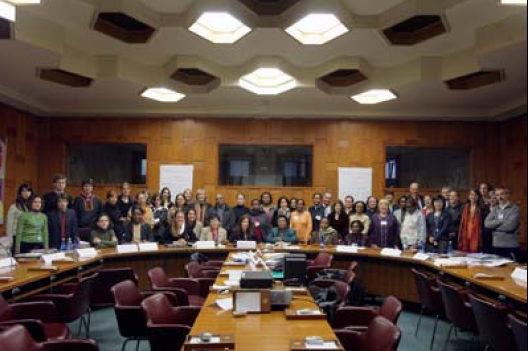Focal point
Location
The Food and Agriculture Organization of the United Nations leads international efforts to defeat hunger. Serving both developed and developing countries, FAO acts as a neutral forum where all nations meet as equals to negotiate agreements and debate policy. FAO is also a source of knowledge and information. We help developing countries and countries in transition modernize and improve agriculture, forestry and fisheries practices and ensure good nutrition for all. Since our founding in 1945, we have focused special attention on developing rural areas, home to 70 percent of the world's poor and hungry people.
Members:
Resources
Displaying 3156 - 3160 of 5074Sharing the Wealth: Policy and Legal Frameworks to Support Equitable Sharing of Costs and Benefits from Community Forestry
Community forestry has great potential to improve the welfare of the estimated 450 million impoverished people living in and around forests in Asia. But the extent to which this potential is realized depends strongly upon whether communities are able to secure the benefits that community managed forests generate, and whether these actually reach the poorest at the community level. The real benefits obtained in return for the time and energy expended by communities in forest management helps to gain their long-term commitment to sustainable forest management.
AQUASTAT - Dams and agriculture in Africa
Gender-based violence and property-grabbing in Africa: a denial of women’s liberty and security
Contains defining gender-based violence; property grabbing as a form of this; HIV and AIDS and property grabbing; women’s property rights: the erosion of customary norms and practice; statutory legal reform � is it the answer?; empirical evidence from Southern and Eastern Africa; responses to property grabbing; conclusion. Argues that the harassment and humiliation that often accompany property grabbing further strip women of their self-esteem, affecting their ability to defend their rights.
Gender and law – Women’s rights in agriculture
Includes the sources of women’s legal status; women’s rights to land and other natural resources; the rights of women agricultural workers; the rights of self-employed rural women; toward the realisation of women’s rights: legal reform and implementation.
Gender, Property Rights and Livelihoods in the Era of AIDS: Proceedings Report
[via FAO] This report is based on the proceedings of the Technical Consultation on Gender, Property Rights and Livelihoods in the Era of AIDS, organized by FAO in November 2008. It takes stock of where FAO and its partners are in terms of addressing property rights insecurity and provides a proposed framework through which future action can take place.









